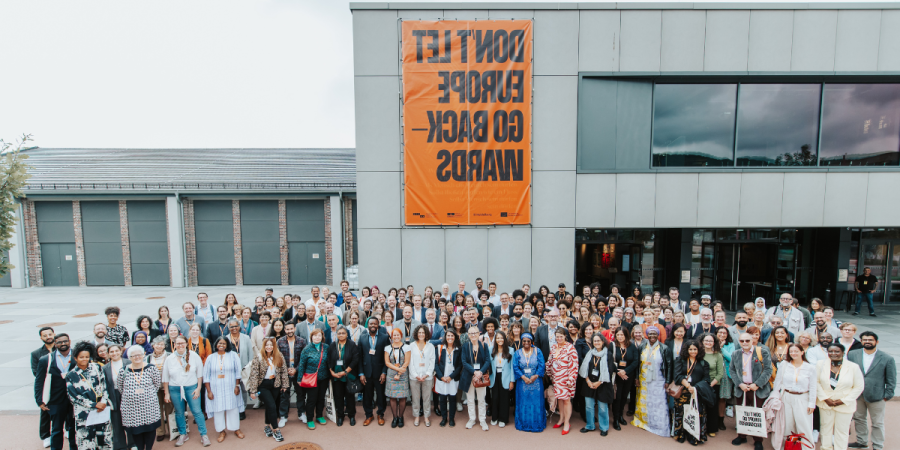
Reflecting on ECCAR’s Foundations and Growth
It was December 10, 2004, and while the world celebrated the anniversary of the Universal Declaration of Human Rights, ECCAR was officially launched in Nuremberg with the presentation of the Ten-Point Plan of Action. Twenty years later, those 12 founding cities have grown to 188. Twenty years later, the world and our local communities still seem to need us. It would be wonderful to write that ECCAR, after two decades, has achieved its mission and can now step aside. While this is not yet the case, we can proudly say that our coalition has made a significant impact, growing in strength and ensuring that the voices of local communities are louder and more influential today than they were twenty years ago.
ECCAR as a Bridge for Inclusion and Diversity
As I write these lines, reflecting on where we come from, I am in Barcelona with the Vice President Anabel Basanta, Danijel Cubelic, Bartek Ciążyński, and the Director of the ECCAR Office Evein Obulor at the 4th UNESCO Global Forum against Racism and Discrimination. I realize that our strength lies in leveraging our diversity. Thanks to our sense of community, our collaborative work through working groups, and the relationships we build with other networks and institutions, ECCAR serves as a bridge between local authorities, their needs and aspirations, supranational institutions, and civil society. This is our natural vocation: ECCAR is created by cities, with cities, and for cities. Cities are where life unfolds, where dreams are pursued, and where the essence of humanity finds expression in the interplay of cultures, ideas, and aspirations.
The Mission of Cities: Inclusion and Prosperity
To serve cities means facilitating healthy and fair relationships among their citizens, built on respect for one another and the diversity that defines humanity. For me, as President, serving ECCAR means serving its cities. It means building bridges with entities that can help ECCAR cities work more effectively for their citizens, ensuring that administrative decisions are made to achieve dreams, not to flee from fears.
A Concrete Impact: Examples from Our Cities
ECCAR’s mission comes to life through the impactful work of its member cities. Two of the most recent examples, chosen and awarded the ECCAR Award 2024 as best practices, are as follows: In the category of cities with more than 50,000 inhabitants, Botkyrka (Sweden) was awarded for its TikTok campaign “Reimagining Place: Participatory Communications in the Context of Diversity,” which engaged the local youth from racialized communities. Similarly, in the category of cities with less than 50,000 inhabitants, Dudelange (Luxembourg) won the award for its project on cultural diversity titled “Month of Respect,” which addressed the issue of how to communicate one’s ideas and feelings respectfully. These initiatives highlight the tangible outcomes of ECCAR’s collective effort to combat racism and foster inclusion.
Collaboration for a Global Mission
At the beginning of December, I was in Cape Town, invited by our partner network, the “Strong Cities Network.” Together with representatives of 13 other global or regional networks[1], I signed a declaration that unites these networks in the fight against hate and the construction of resilient communities worldwide. But it is not just about the signature. It reflects ECCAR’s commitment, after 20 years, to open itself to collaboration with other networks to join forces. We have grown; others recognize us and seek our involvement through the work of our cities on data, antisemitism, anti-Muslim hatred, anti-Black racism, and discrimination against Roma populations. But also through our focus on smaller urban communities that often struggle with limited human and economic resources in a fight against racism that constantly reminds us of the foundation of our societies: coexistence in diversity.
Inspiration from Broader Perspectives
If these reasons are not enough, we can also draw inspiration from the Nobel Committee, which this year awarded the Nobel Prize in Economics to Daron Acemoglu, Simon Johnson, and James A. Robinson. In their award statement, they wrote: “The introduction of inclusive institutions would create long-term benefits for everyone (…) Reducing the vast differences in income between countries is one of our time’s greatest challenges. The laureates have demonstrated the importance of societal institutions for achieving this.” The prosperity of a community does not come by chance but through inclusive institutions. The cities of ECCAR belong to this group; they have an inclusive vision that looks toward the future and prosperity.
Looking Ahead: The Next 20 Years
This is the starting point for the next 20 years: to support each other as cities, continue exchanging good practices, analyzing our data through the report system, and strengthening our relationships with the European Commission, UNESCO, and other networks. These efforts will amplify our voice and help our citizens lead more dignified and prosperous lives.
Happy anniversary, ECCAR, and as the Latins used to say, ad multos annos, which in the three official languages of ECCAR sounds more or less like this: for many more years, auf viele Jahre, pour de nombreuses années.
Benedetto Zacchiroli, 10/12/2024
[1] The Declaration has been endorsed by:
Center for Community Organizing (CKO)
Council of Governors of Kenya
East African County and Local Governments Association (EACLGA)
European Coalition of Cities Against Racism (ECCAR)
European Forum for Urban Security (Efus)
Foundation for a Path Forward (F4PF)
Ilifindo
National League of Cities (NLC)
Nordic Safe Cities
Strong Cities Network
Tamarack Institute for Community Engagement
United Cities Local Governments (UCLG)
US Council of Mayors (USCM)
Zanzibar Association of Local Government Authorities (ZALGA)
